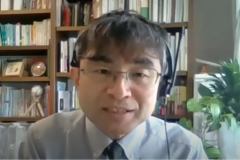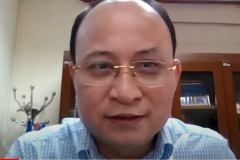Webinar Looks at the Rise of Intra-Regional Emerging Donors in Southeast Asia
2021.05.01
“Webinar on Changing Landscape of Development Cooperation in Southeast Asia: Great Power Politics and ASEAN Aspiration” was held March 25, 2021, with the JICA Ogata Sadako Research Institute for Peace and Development (JICA Ogata Research Institute) hosting.
The event introduced preliminary results of joint research organized by the JICA Ogata Research Institute under the umbrella of the Policy Research Network on Contemporary Southeast Asia (PRN-SEA), jointly hosted by National Graduate Institute for Policy Studies (GRIPS) of Japan, the S. Rajaratnam School of International Studies (RSIS) of Singapore and the Centre for Strategic and International Studies (CSIS) of Indonesia. The participants included Shiga Hiroaki, executive senior research fellow, JICA Ogata Research Institute, who gave the opening remarks, as well as Nguyen Huy Hoang of the Vietnamese Academy of Social Sciences, Institute for Southeast Asian Studies; Yulius Purwadi Hermawan of Parahyangan Catholic University, Indonesia; Siriporn Wajjwalku, Thammasat University, Thailand; and Murotani Ryutaro, senior director and head of the Office of Peacebuilding, Governance and Peacebuilding Department, JICA, who moderated.
In his opening remarks, Shiga gave background on the research, saying it was initiated with the recognition that the landscape of development cooperation in Southeast Asia is changing due to the intensification of great power rivalry, particularly between China and the U.S., which have employed development cooperation as a tool or even a weapon for a great power diplomacy. Against the backdrop of this situation, he asserts that ASEAN countries are facing both challenges and opportunities. He said Sino-U.S. confrontation may endanger the expected coming of a prosperous Asian century and ASEAN centrality, but at the same time, may provide an opportunity for ASEAN countries to reinvigorate South-South cooperation by intra-regional emerging donors, and to consolidate their lessons of their own unique socio-economic development. He said the project aims to examine the activities of the intra-regional emerging donors and the unique resources they can mobilize in order to provide policy implications for the reinvigoration of South-South Cooperation in the region.

Shiga Hiroaki, executive senior research fellow at JICA Ogata Research Institute, gave the opening remarks
The three guests spoke on the theme of the rise of intra-regional emerging donors.
Hoang’s presentation was entitled "Changing Landscape of ODA in Southeast Asia: The Case of Viet Nam (Viet Nam's SSC toward neighboring countries)." He described Vietnam’s evolution from ODA recipient to regional donor. After the country introduced market-based reforms in 1986, it began to receive ODA from donors including the World Bank, the Asian Development Bank, Japan, South Korea and China. This aid peaked in 2014 at $4.22 billion. As Vietnam became a middle-income country, it began providing development cooperation to its neighbors, Cambodia, Laos and Myanmar, in sectors including agriculture, infrastructure, education & training and health. He concluded by recommending that Vietnam continue its assistance to the three countries and build collaboration among Indo-Chinese countries, fostering development and cooperation in the Cambodia-Laos-Vietnam development triangle to promote South-South cooperation, and call for support from other countries such as Japan, South Korea and the United States.

Nguyen Huy Hoang of the Vietnamese Academy of Social Sciences, Institute for Southeast Asian Studies, gave a presentation
Hermawan’s presentation was entitled “Lessons Learned from the Establishment of the Indonesian Agency for International Development (Indonesian AID).” He described the situation prior to the establishment of Indonesian AID in 2019 as facing many barriers to effective development assistance by Indonesia. These included the involvement of many ministries and institutions in South-South and triangular cooperation, the lack of an effective framework for them and a prohibition of multi-year budgetary items. This led to the introduction of a “One Gate Policy,” which consolidated such assistance under Indonesian AID. The top beneficiary countries of Indonesia’s overseas cooperation in 2019 were Timor Leste, Laos, Afghanistan, Palestine, Bangladesh, Fiji, Philippines, Myanmar, Vietnam and Sri Lanka.

Yulius Purwadi Hermawan of Parahyangan Catholic University gave a presentation
The last speaker was Wajjwalku. Her presentation was entitled, "Thailand: Moving forward to be an active regional provider." She said Thailand was a recipient of aid beginning in the 1950s, but in the 2000s it became a middle-income country. It continued receiving aid but also began aiding neighboring countries. There were three objectives behind this move: building cordial relationships, economic cooperation and regional integration. To facilitate the provision of assistance, two agencies, Thailand International Cooperation Agency (TICA) and Neighbouring Countries Economic Development (NEDA) were established by royal decree in 2004 and 2005, respectively. She explained that as in Indonesia, however, assistance policy was fragmented, with the TICA and NEDA policy initiatives separated from national policy, TICA having limited authority and function, there being limited coordination between the two agencies and with line ministries, and a lack of capacity and human resources. In 2015, however, TICA became a coordinating body and NEDA an alternative financial source for development. Line ministries involved in foreign assistance were required to report to TICA. Funding was allocated from the national budget and NEDA. Wajjwalku concluded by saying the aid architecture remains too fragmented and a challenge for the future will be integrating TICA and NEDA into one body. Other future challenges include scaling up foreign assistance, providing financial predictability, standardizing data collection and providing for a monitoring and evaluation mechanism.

Siriporn Wajjwalku of Thammasat University, Thailand, gave a presentation
After the presentation, Murotani asked the participants questions submitted from the audience. This was followed by an active exchange of opinions.

事業事前評価表(地球規模課題対応国際科学技術協力(SATREPS)).国際協力機構 地球環境部 . 防災第一チーム. 1.案件名.国 名: フィリピン共和国.

事業事前評価表(地球規模課題対応国際科学技術協力(SATREPS)).国際協力機構 地球環境部 . 防災第一チーム. 1.案件名.国 名: フィリピン共和国.

事業事前評価表(地球規模課題対応国際科学技術協力(SATREPS)).国際協力機構 地球環境部 . 防災第一チーム. 1.案件名.国 名: フィリピン共和国.

事業事前評価表(地球規模課題対応国際科学技術協力(SATREPS)).国際協力機構 地球環境部 . 防災第一チーム. 1.案件名.国 名: フィリピン共和国.

事業事前評価表(地球規模課題対応国際科学技術協力(SATREPS)).国際協力機構 地球環境部 . 防災第一チーム. 1.案件名.国 名: フィリピン共和国.
scroll